英语四级结构讲义
英语四级讲解
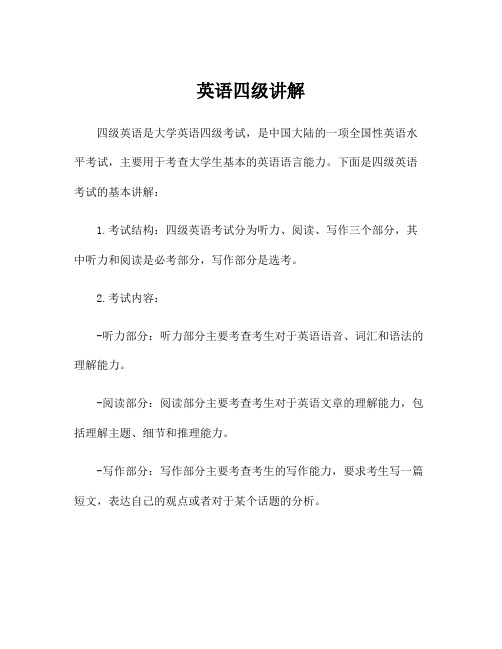
英语四级讲解
四级英语是大学英语四级考试,是中国大陆的一项全国性英语水平考试,主要用于考查大学生基本的英语语言能力。
下面是四级英语考试的基本讲解:
1.考试结构:四级英语考试分为听力、阅读、写作三个部分,其中听力和阅读是必考部分,写作部分是选考。
2.考试内容:
-听力部分:听力部分主要考查考生对于英语语音、词汇和语法的理解能力。
-阅读部分:阅读部分主要考查考生对于英语文章的理解能力,包括理解主题、细节和推理能力。
-写作部分:写作部分主要考查考生的写作能力,要求考生写一篇短文,表达自己的观点或者对于某个话题的分析。
3.考试难度:四级英语考试的难度逐年增加,一般认为四级考试对于大学生来说是一个具有一定难度的考试,需要考生具备一定的英语基础,包括词汇量、语法、听力和阅读能力等。
4.考试方法和技巧:
-听力部分:在听力部分,考生应该注意听清题目要求,做到快速抓住关键信息,并且可以通过多听英语材料来提高听力能力。
-阅读部分:在阅读部分,考生应掌握一些阅读技巧,例如快速阅读、抓住文章的主题句和关键词等。
-写作部分:在写作部分,考生应该明确自己的观点,注意段落结构和句子的连贯性,同时还要注意词汇和语法的正确使用。
总的来说,四级英语考试是考查考生英语语言能力的一种方式,通过充分准备考生可以提高通过考试的几率。
平时应多进行听力和阅读练习,并提高英语写作能力。
大学英语四级(cet4)语法讲义
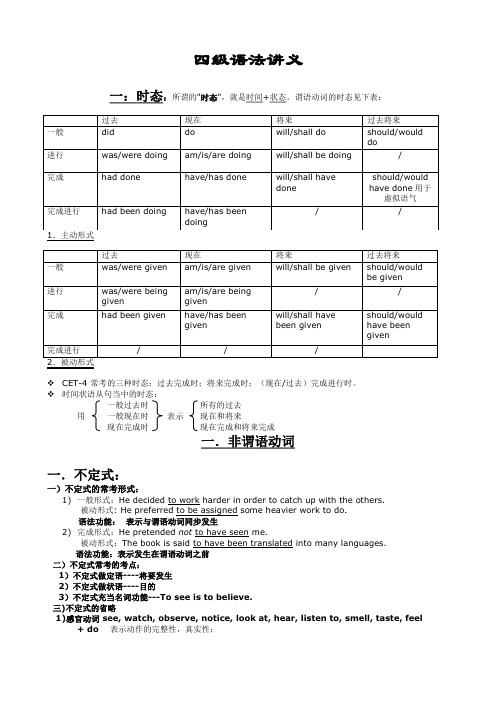
四级语法讲义一:时态:所谓的"时态",就是时间+状态。
谓语动词的时态见下表:1.主动形式2.被动形式CET-4 常考的三种时态:过去完成时;将来完成时;(现在/过去)完成进行时。
时间状语从句当中的时态:一般过去时所有的过去用一般现在时表示现在和将来现在完成时现在完成和将来完成一.非谓语动词一.不定式:一)不定式的常考形式:1)一般形式:He decided to work harder in order to catch up with the others.被动形式: He preferred to be assigned some heavier work to do.语法功能:表示与谓语动词同步发生2)完成形式:He pretended not to have seen me.被动形式:The book is said to have been translated into many languages.语法功能:表示发生在谓语动词之前二)不定式常考的考点:1)不定式做定语----将要发生2)不定式做状语----目的3)不定式充当名词功能---To see is to believe.三)不定式的省略1)感官动词 see, watch, observe, notice, look at, hear, listen to, smell, taste, feel+ do表示动作的完整性,真实性;+ doing表示动作的连续性,进行性I saw him work in the garden yesterday.昨天我看见他在花园里干活了。
(强调"我看见了"这个事实)I saw him working in the garden yesterday.昨天我见他正在花园里干活。
(强调"我见他正干活"这个动作)感官动词后面接形容词而不是副词:The cake tastes good; It feels comfortable.2) 使役动词 have bid make let 等词后不定式要省略但同1)一样被动以后要还原toI ‘d like to have John do it.I have my package weighed.Paul doesn’t have to be mad e to learn.3) help help sb do help sb to do help do help to do四)有些动词后只跟不定式如:want,wish,hope,manage,promise,refuse,pretend,plan, offer,decide,agree,expect allow sb to do, cause sb to do , permit sb to do, enable sb to doforce sb to do. be more likely to do love to do warn sb to do be able to dobe ambitious to do. begin to do . start to do五) 有的时候to后面要接-ing形式accustom (oneself) to; be accustomed to; face up to; in addition to; look forward to; object to; be reduced to; resign oneself to; be resigned to; resort to; sink to; be used to; be alternative to; be close/closeness to; be dedication/dedicated to; be opposition/opposed to; besimilarity/similar to.三、need/want 后的-ing形式具有被动的意思。
大学英语四级分值构成上课讲义

3) 完型填空
完型填空(Cloze)测试学生各个层面上的 语言理解能力及语言运用能力。短文长度 为220-250词,内容是学生所熟悉的题材。 这部分的分值比例为10%,考试时间15 分 钟。
完型填空部分的短文有20个空白,空白处 所删去的词既有实词也有虚词,每个空白 为一题,每题有四个选择项。要求考生选 择一个最佳答案,使短文的意思和结构恢 复完整。
仔细阅读部分要求考生阅读三篇短文。两篇为多项选择 题的短文理解测试,每篇长度为300-350词。一篇为选 词填空(Banked Cloze)或简答题(Short Answer Questions)。选词填空篇章长度为200-250词,简答题 篇章长度为300-350词。仔细阅读部分测试考生在不同 层面上的阅读理解能力,包括理解主旨大意和重要细节、 综合分析、推测判断以及根据上下文推测词义等。
4) 写作和翻译
写作(Writing)和翻译(Translation)部分测试学 生用英语进行书面表达的能力,所占分值比例为 20%,其中写作15%,翻译5%,考试时间35 分钟。
写作选用考生所熟悉的题材。考生根据规定的题目 和所提供的提纲、情景、图片或图表等,写出一篇 不少于120词的短文。写作要求是思想表达准确、 意义连贯、无严重语法错误。考试时间30分钟。
快速阅读部分采用1-2篇较长篇幅的文章或多 篇短文,总长度约为1000词。要求考生运用 略读和查读的技能从篇章中获取信息。略读 考核学生通过快速阅读获取文章主旨大意或 中心思想的能力,阅读速度约每分钟100词。 查读考核学生利用各种提示,如数字、大写 单词、段首或句首词等,快速查找特定信息 的能力。快速阅读理解部分采用的题型有是 非判断、句子填空、完成句子等。
多项选择题型的短文后有若干个问题,考生根 据对文章的理解,从每题的四个选项中选择最 佳答案。选词填空测试考生对篇章语境中的词 汇理解和运用能力。要求考生阅读一篇删去若 干词汇的短文,然后从所给的选项中选择正确 的词汇填空,使短文复原。简答题的篇章后有 若干个问题,要求考生根据对文章的理解用最 简短的表述(少于10个词)回答问题或完成 句子。
大学英语四级语法(词汇与结构)辅导讲义

词汇curse 诅咒sting 钉abroad 出国assiduous 聚精会神torpedo 鱼雷late✂later✂latter✂latestaccess 进入excess 过分concession 让步approach 接近faithful 忠实的obedient 顺从的shrew 悍妇second (不能被more修饰)位于第二inferior (不能被more修饰)更低级的inferior (不能被more修饰)更高级的superior (不能被more修饰)更优先的generous 慷慨legacy 财产property 财产remedy 配方,治疗heal 治疗(过程中)cure 治好了treaty 协议amount 数量,等于,总计diverse 不同的ideal 理想steal 偷seal 图章deal 处理,应付conceal 隐瞒appeal 呼吁reveal 揭露economy 经济economic 经济的(life生活/crisis危机)economics 经济学economical 节俭的(=frugal)paper 文件、论文、报纸、纸张husband 节俭的生活extensive 广泛的intensive 精心的recognize 认识spot 发现identify 考察serve 服务reserve 预定deserve 值得preserve 保留,腌浸zenith 天顶enrich 丰富(横向)enhance 丰富,提高(纵向)vanish 消失rise-rose-risen 上升(太阳、数据)by 20% arise-arose-arisen 出现,浮现(situation , danger)raise 抬起来,抚养arouse 唤起rate 速率production rate 费用dailyratepace 节奏步伐the pace of lifespeed 速度step 脚步take steps to doadapt 适应(人的心态)adopt 抚养,收养adjust 适应(人的心态,机器调整)adept 熟练的artificial 人造的+flowersfake 假的+moneyfalse 伪造的+teethunreal 一件事情不是真的unnatural 不自然的+smilemodest 谦虚的honest 诚实的humble = integrity 谦逊的late later latter / former latestI am alone , but I am not lonelypoor pool pour 穷 群 倾泻contest 比赛protest 反抗conquer 征服creativity 创造力(中立)creativeness 创造力(正评价)creation 发明创造acquire = pick up language/skilldespair 绝望resemble 长得像tremble 颤抖tremendous 巨大的,可怕的insane 疯狂fatigues 劳累exhaust 劳累ignore (故意的)忽略,不理睬ignorant 无知的illuminate 照亮illusion 幻觉grants 因为批准而颁发(学位)award 因为优秀而颁发(奖学金)overlook (不小心)忽略neglect 蔑视omit 省略proof 证明,证据approve 批准,通过chance 机会,运气(pl.)系动词用are/wereattitude 态度altitude (海拔)高度matter 毛病issue (政治)事变/事故accident 事故incident 日常事件event 历史大事词组:work out 解决,健身work on 致力于make out 分辨出,辨认出,狂吻,亲热name after 以……命名look after 照顾take after 长得像,性格像go/come after(+a goal/an aim)追求(目标)sold out 卖出wear out worn out (物)破旧不堪;(人)筋疲力尽check out 借书,退房figure out 想清楚,弄明白,解决问题help out 帮大忙hang out 闲逛,漫无目的地溜达cook out 野餐dine out 去餐馆吃饭turn out 结果证明事实如此sth. doesn’t agree with sb. 某人不适应某物cheat on you 欺骗你(的感情)cheat you 欺骗你cheat in (the exam)作弊in danger 在危险中under threat 在威胁下under construction 在建造中in discussion 在讨论中beyond imagination 无法想象beyond repair 无法补救beyond understanding 无法理解take to 喜欢+sth. / doingtake after 长得像take over 接管take up 占据(时间、空间)take on 承担+duty / reasonabilitytake in 理解,领悟,吸收be taken in 欺骗,欺负break up 分手get over 克服,忘记hand over 移交carry away 吸引lead to = result in 导致result from 由于the instant = as soon as 一…就…in an instant = in a minute 马上,立刻for an instant = for the moment 暂时,目前with in reach 够得着out of reach 够不着contrary to 与……相反in contrast to 形成……对比compare with 与……相比be compared to 把……比作go for 去做blind date 相亲turn up=show up=appear 出现turn down=refuse=reject 拒绝turn out to be 结果竟然是turn on 使……产生兴趣,打开turn off 关掉, 避开, 生产, 制造, 使厌烦miss classfill in/out/up 填表格break down 抛锚,坏了break out 起火break off 折断make out 解决,弄懂work out 解决,弄懂,健身,行得通figure out 弄懂go (along)with 与……相处take into account/coincident 考虑toast to 干杯cheer to 喝彩cut out 停止下来call on 拜访call at 停靠call off 取消call for 要求entitle sb to 授予lay out 陈列展览lay off 下岗,解雇generation gap 代沟come across 巧遇run across 巧遇run into 巧遇run over 辗过bump into 撞击,撞到某人,巧遇某人go through 经历see through 看穿,识破pull through 度过难关died of 死于(内因)died from 死于(外因)keep an eye on =see to 照顾,帮助句型:such ……that……与such ……as ……例句:1.黄伸is such a bad egg that she loves him deeply.2.黄伸isn’t such a bad egg as he promised her.want / need +doing / to be donedeserve / worth +doingNo sooner +过去完成时+than+一般过去时一……就Hardly +过去完成时+when+一般过去时还没有……就尽管……还是……:以even though/if 引导的让步状语从句,把作为表语的形容词,或者副词,或者动词的副词,提前到主语之前并且把even though/if改为as,直接构成倒装虚拟语气:It’s important/necessary/essential(本质的,基本的)/critical(危急的)+that(should)dowould rather/just as soon宁愿but for 要不是因为……if only 要是……就好了in case,for fear,lest以防万一+should do平行结构:rather than + do(省略了to)be up late to doing sth 这么晚还不睡做……There is no point (in)doing sth词汇量:四级要求4200~4800个,阅读理解要求600~800个,词汇与结构要求300~400个。
大学英语四级语法讲义

大学英语四级主要语法句子成分组成句子的各个部分叫句子成分。
英语句子成分有主语,谓语,表语,宾语,宾语补足语,定语,状语等。
顺序一般是主语,谓语,宾语,宾语补足语,而表语,定语,状语的位置要根据情况而定。
1、主语主语表示句子主要说明的人或事物,一般由名词,代词,数词,不定式等充当。
Helikeswatch'ingTV.他喜欢看电视。
2、谓语谓语说明主语的动作,状态或特征。
一般可分为两类:1),简单谓语由动词(或短语动词)构成。
可以有不同的时态,语态和语气。
Westud'yforthepeo'ple.我们为人民学习。
2),复合谓语:情态动词+不定式Icanspeakalit'tleEng'lish.我可以说一点英语。
3、表语表语是谓语的一部分,它位于系动词如be之后,说明主语身份,特征,属性或状态。
一般由名词,代词,形容词,副词,不定式,介词短语等充当。
Mysis'terisanurse.我姐姐是护士。
4、宾语宾语表示动作行为的对象,跟在及物动词之后,能作宾语的有名词,代词,数词,动词不定式等。
WelikeEng'lish.我们喜欢英语。
有些及物动词可以带两个宾语,往往一个指人,一个指物,指人的叫间接宾语,指物的叫直接宾语。
Hegavemesom'eink.他给了我一点墨水。
有些及物动词的宾语后面还需要有一个补足语,意思才完整,宾语和它的补足语构成复合宾语。
如:Wemakehimourmon'itor.我们选他当班长。
5、定语在句中修饰名词或代词的成分叫定语。
用作定语的主要是形容词,代词,数词,名词,副词,动词不定式,介词短语等。
形容词,代词,数词,名词等作定语时,通常放在被修饰的词前面。
Heisanewstu'dent.他是个新生。
但副词,动词不定式,介词短语等作定语时,则放在被修饰的词之后。
Thebikeintheroomismine.房间里的自行车是我的。
大学英语四级考试讲座及辅导PPT课件

Listening skills and precautions
Preparation before listening: Predict the type of questions, skim through the listening material, and identify key words and topics
01
Overview of College
English Test Band 4
Purpose and significance of the exam
Assessing English proficiency
The College English Test Band 4 (CET4) is designed to assess the English proficiency of college students It evaluates their ability to communicate effectively in English across different contexts
04
Familiarize yourself with the format and structure of the exam to ensure that you are prepared for the test day
03
Reading comprehension exam preparation strategies
Note taking&Summarizing
These questions test students' ability to quickly read and compare information, and then present it in a condensed format Practice in note taking and summarizing techniques is essential
大学英语四级考试培训讲义

掌握常用词根和词缀,扩大词汇量,对生词有更深 的理解。
短语搭配
学习常用短语和搭配,提高语言表达的流利性和自 然度。
同义词辨析
了解同义词的细微差别,提高词汇准确性和运用能 力。
多读多写
通过大量阅读和写作练习,巩固词汇并提高运用能 力。
听力理解技巧
1
准备阶段
熟悉常见题型、提前预览问题,养成积极主动的听力态度。
2
关键信息
识别关键词和词组,提高听力理解的准确性。
3
笔记技巧
运用符号、缩写等技巧记录重要信息,有助于回答听力问题。
语法复习和练习
重点复习
整理并复习常见语法知识点,强化语法应用能力。
练习题目
进行语法练习,巩固知识点和提高答题技巧。
写作策略和技巧
结构规划
合理安排段落结构,确保文章逻辑清晰、条理分明。
冲刺模拟考试
通过模拟考试,帮助学生了解真实考试环境,检测并提高英语水平。
语言表达
丰富词汇,正确运用语法,提高写作质量和表达能 力。
避免常见错误
注意拼写、语法和标点等细节错误,提高写作准确 性。
练习实践
进行写作练习,积累经验,提高写作速度和自信心。
答题策略和时间管理
了解常见题型和解题思路 适应考试节奏,掌握时间分配 有效利用考试时间,避免拖延和赶时间 提高答题准确性和速度
考试概述
了解C E T 4 考试的基本概况,帮助学生对考试形式和内容有个整体认识。
阅读理解策略
1
预览浏览
有效使用标题、首段、引题、图片、图表等信息来获得整体意义。
2
细节把握
掌握寻找特定信息、推理判断、推断作者态度等技巧,提高答题准确性。
《cet-4教学资料》新四级讲义

理解不定式、动名词和分词等非谓语动词的用法和区别。
从句与主从复合句
掌握名词性从句、定语从句和状语从句的用法,以及主从复合句的 结构和逻辑关系。
词汇与语法题型分析
阅读理解
分析阅读理解中常见的词汇和语法难点,以及解题技巧。
完形填空
分析完形填空中常见的词汇和语法考点,以及如何根据上下文选 择合适的选项。
翻译
分析汉译英和英译汉中的常见词汇和语法问题,以及如何准确地 进行语言转换。
06 应试策略与技巧
CHAPTER
考前准备
1 2
制定复习计划
根据考试时间,合理安排每日复习时间,确保全 面复习。
熟悉考Байду номын сангаас题型
了解各类题型的特点和答题要求,以便在考试中 应对自如。
3
积累词汇和语法知识
扩大词汇量,掌握基本语法知识,提高阅读和写 作能力。
答题技巧
阅读理解
听力理解
先读题干,再根据关键词回原文找答案, 注意把握文章结构和逻辑关系。
提前审题,抓住关键词,注意捕捉听力中 的重要信息和细节。
写作
翻译
审清题目要求,列出要点,注意段落和层 次,使用简单句和常用词汇。
理解原文意思,注意语言表达的准确性和 流畅性,适当调整语序和句式。
心理调适
保持积极心态
相信自己能够通过考试, 遇到困难时及时调整心 态。
合理安排休息时间
保证充足的睡眠和休息, 避免过度疲劳影响考试 发挥。
模拟考试与反思
参加模拟考试,了解自 己的薄弱环节,及时调 整复习策略。
谢谢
THANKS
句式转换
介绍常见的句式转换技巧,如被动 句与主动句的转换、肯定句与否定 句的转换等。
大学英语四级阅读课件:理解句子结构相关知识点

本课件旨在帮助学生理解英语句子结构的基本要素,包括名词性从句、副词 性从句、形容词性从句、介词短语、不定式和动名词的结构。通过学习这些 知识,学生将能更好地理解文章,提高阅读速度和准确性。
I. 句子结构的基本要素
主语
句子中的主要话题或动 作的执行者。
谓语
连词
用于引导副词性从句的 词语。
IV. 形容词性从句的结构
主句
包含形容词性从句的句 子。
Байду номын сангаас从句
作为形容词的从句,用 于描述主句中的名词或 代词。
连词
用于引导形容词性从句 的词语。
V. 介词短语的结构
介词
用于表示位置、时间、原因等关系的词语。
对象
介词所作用的名词、代词或动名词。
修饰语
用来修饰或限定介词短语的词语。
掌握句子结构可以帮助学生更好地理解英语文 章,并提高写作水平。
总结学习要点
归纳重要知识点和学习方法,帮助学生巩固所 学内容。
者更好地理解文章
通过掌握句子结构,读者可以更好地 理解作者的意图和信息的组织。
2 掌握常见的句子结构可以提高
阅读速度和准确性
熟悉常见的句子结构可以快速分析句 子,从而提高阅读的速度和准确性。
IX. 练习题
通过练习题加深对于句子结构的理解,并指导学生如何从练习题中发现句子 结构的规律。
X. 总结
强调句子结构在阅读和写作中的重要 性
VI. 不定式的结构
"to" + 动词原形
构成不定式的基本形式。
作主语、宾语、表语、定语
不定式可以在句子中充当不同的句子成分。
VII. 动名词的结构
三 四级考试中常见的结构讲解

此时谓语动词应用复数。
• 4. each, every, either, some, any, no,由 以上六个词中任何一个所构成的复合代词作 主语时;
• some经常构成的三个复合代词:something, somebody, someone; • no经常构成的三个复合代词:nothing, nobody, no one; • either of + 短语;
• 7、 it is time 是...的时候了。 • 这个结构有以下两种变形形式,所用虚拟 语气形式都一样:it is high time / it is about time.
• 这三个结构后面加的句子谓语动词都用一 般过去时来体现虚拟语气。
• 8、 注意以下两种情况下should + 动词原形中 should不能省略。 • 这里should表示一种语气,经常被翻译成“竟然”。
结构四 虚拟语气
• • • •
一、虚拟语气的规则用法: 1、主、从句都表示与过去事实相反: 从句的谓语动词用:had + 动词过去分词; 主句的谓语动词用:情态动词 + have + 动词 过去分词。
• 注意:能用于虚拟语气的情态动词只有四个: should, could, would, might. 使用哪一个情 态动词要由句子含义决定,考试中出现最多的 是could, would.
• 5. only + 状语放在句首,句子用部分倒装; (如果only去掉就是全部倒装) • 6. 注意两个表达形式:come what may 无 论发生什么情况; say what you will 畅所 欲言。
结构三 主谓一致
主谓一致:指的就是给出主语, 要求判断谓语动词是用单数还 是复数的问题。
大学英语四六级语法讲义
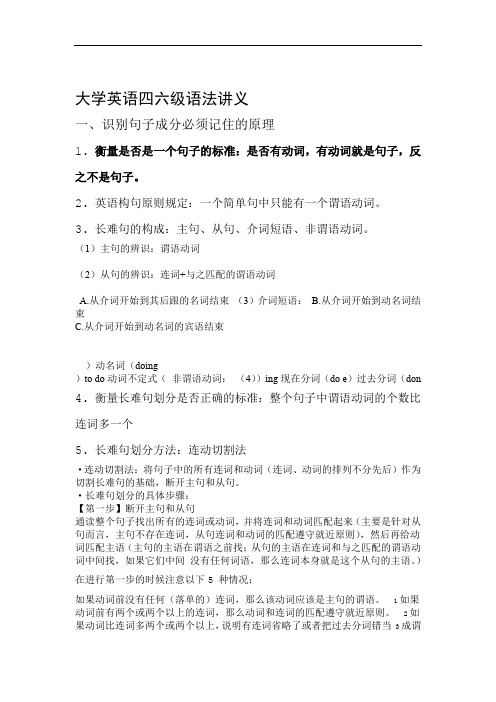
大学英语四六级语法讲义一、识别句子成分必须记住的原理1.衡量是否是一个句子的标准:是否有动词,有动词就是句子,反之不是句子。
2.英语构句原则规定:一个简单句中只能有一个谓语动词。
3.长难句的构成:主句、从句、介词短语、非谓语动词。
(1)主句的辨识:谓语动词(2)从句的辨识:连词+与之匹配的谓语动词A.从介词开始到其后跟的名词结束(3)介词短语:B.从介词开始到动名词结束C.从介词开始到动名词的宾语结束)动名词(doing)to do动词不定式(非谓语动词:(4))ing现在分词(do e)过去分词(don4.衡量长难句划分是否正确的标准:整个句子中谓语动词的个数比连词多一个5.长难句划分方法:连动切割法·连动切割法:将句子中的所有连词和动词(连词、动词的排列不分先后)作为切割长难句的基础,断开主句和从句。
·长难句划分的具体步骤:【第一步】断开主句和从句通读整个句子找出所有的连词或动词,并将连词和动词匹配起来(主要是针对从句而言,主句不存在连词,从句连词和动词的匹配遵守就近原则),然后再给动词匹配主语(主句的主语在谓语之前找;从句的主语在连词和与之匹配的谓语动词中间找,如果它们中间没有任何词语,那么连词本身就是这个从句的主语。
)在进行第一步的时候注意以下5 种情况:如果动词前没有任何(落单的)连词,那么该动词应该是主句的谓语。
1如果动词前有两个或两个以上的连词,那么动词和连词的匹配遵守就近原则。
2如果动词比连词多两个或两个以上,说明有连词省略了或者把过去分词错当3成谓语动词。
切割嵌套的从句:从句往往从连词开始到从句中的第二个谓语动词出现之前4结束。
有些词既可以是连词,也可以具有别的词性5例如:that:既可以是连词,也可以是代词或者限定词;than、before、after、until 等既可以是连词也可以是介词【第二步】断开介词短语和非谓语动词二、总结复习句子的主要成分1、主语(1)定义:主语是动作的发出者。
大学英语四级讲义readingindepth
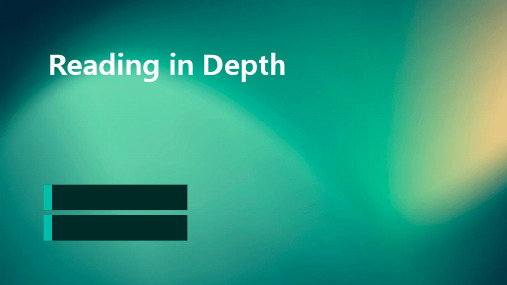
目录
• Overview of Reading comprehension
• Reading skills and strategies • Analysis of Reading comprehension
question types • Reading comprehension problem
Quick reading skills
Skimming
Quickly scanning text to get the gift of the content without reading every detail
Scanning
Finding specific information by quickly moving the eyes across the text
Inference and True/False Questions
The reasoning and judgment questions mainly test students' understanding and logical analysis ability of the implicit meaning in the article.
This type of question requires students to summarize the theme or main points of the article, or identify important information in the article. Answering such questions requires students to understand the overall structure and content of the article, and be able to extract core information.
大学英语四级讲义

大学英语四级讲义第一部分:听力理解1. 听力概述大学英语四级听力是考查学生对常见口语表达以及关键信息的理解能力。
听力理解分为四个部分:对话理解、长对话理解、短文理解和复合式听写。
2. 对话理解对话理解主要考察学生根据对话内容进行问题回答、信息补全和逻辑推理等能力。
对话类型通常包括日常生活对话、学校场景对话、购物对话等。
3. 长对话理解长对话理解要求学生从一段长对话中获取关键信息,例如对话中涉及的人物、地点、时间、事件等。
同时,还需要学生能够理解对话双方的观点、态度和意图。
4. 短文理解短文理解要求学生从一篇短文中获取关键信息,并回答问题或完成填空等任务。
短文通常包括新闻报道、广播公告、学术讲座等。
5. 复合式听写复合式听写是将听力和写作结合的一种考察形式。
学生需要在听力材料播放时,正确听写出所缺的单词或短语。
第二部分:阅读理解1. 阅读概述大学英语四级阅读理解包括三个部分:长篇阅读、短篇阅读和补全短文。
阅读理解考察学生对不同类型文章的理解能力、归纳总结能力和推理判断能力。
2. 长篇阅读长篇阅读要求学生阅读一篇较长篇幅的文章,并回答相应的问题。
文章通常包括社会、科学和文化等不同领域的内容。
3. 短篇阅读短篇阅读要求学生阅读一篇短文,并回答相关问题。
短文类型多样,涉及生活、学术、科技等各个领域。
4. 补全短文补全短文是一种需要学生根据文章内容和上下文推断,将给出的选项填写到短文中,使其完整通顺的题型。
第三部分:写作能力1. 写作概述大学英语四级写作要求学生能够根据提供的问题或图表进行写作,包括短文写作和作文写作两种形式。
2. 短文写作短文写作要求学生在规定字数内完成一篇短文,包含开头、主体和结尾。
学生需要将所给的提示用合适的语言进行表达。
3. 作文写作作文写作是四级写作考试中较长的一篇文章,学生需要在规定时间内完成一篇200-250字的作文。
作文题目涵盖学校生活、社会问题、科技进步等各个方面。
第四部分:综合能力1. 词汇与语法大学英语四级考试中的词汇与语法部分旨在检验学生对词汇和语法规则的掌握程度。
大学英语四级精讲课件

大学英语四级精讲课件一、教学内容二、教学目标1. 学生能够听懂、会说、会读本节课的生词和句子,能够运用所学知识进行简单的日常交流。
2. 学生能够通过观察图片,理解日常活动的含义,并能用英语进行描述。
三、教学难点与重点重点:学生能够听懂、会说、会读本节课的生词和句子,能够运用所学知识进行简单的日常交流。
难点:学生能够正确运用 "What time do you go to school?" 和 "I go to school at 8:00." 进行询问和回答时间。
四、教具与学具准备教具:课件、黑板、粉笔学具:教科书、练习本、文具五、教学过程1. 情景引入:教师通过课件展示学校的主要场所和活动,引导学生观察并思考,引出本节课的话题。
2. 新课导入:教师引导学生学习生词和句子,通过示范、模仿、重复等方式,使学生能够听懂、会说、会读。
3. 课堂练习:教师设计随堂练习,让学生通过听、说、读、写的方式,巩固所学知识。
4. 小组活动:教师组织学生进行小组活动,让学生运用所学知识进行日常交流,培养学生的合作能力和交际能力。
6. 作业布置:教师布置作业,让学生巩固所学知识。
六、板书设计板书设计如下:My SchoolClassroom Library PlaygroundWhat time do you go to school?I go to school at 8:00.What do you do in the morning?I read books in the library in the morning.七、作业设计1. 抄写生词和句子,每个生词和句子抄写两遍。
2. 用所学生词和句子编写一个关于学校日常活动的短文。
八、课后反思及拓展延伸课后反思:本节课通过情景引入、新课导入、课堂练习、小组活动等环节,使学生能够听懂、会说、会读本节课的生词和句子,能够运用所学知识进行简单的日常交流。
英语四级讲义

英语四级讲义The English Level 4 exam is a significant milestone for many students, offering a platform to showcase their language proficiency. It requires a deep understanding of grammar, vocabulary, and the ability to comprehend complex texts.Preparing for this exam involves not only memorizing a vast array of words but also the ability to use them in context. Practice is key, and engaging with a variety of texts, from newspapers to novels, can enhance reading comprehension skills.Listening skills are equally important. Regular exposure to English through podcasts, movies, or music helps in understanding different accents and speech patterns. It's crucial to train the ear to pick up on nuances that might be missed in written text.Speaking is an interactive component of the exam that tests fluency and the ability to express thoughts coherently. Engaging in conversation with native speakers or fellow learners can be immensely beneficial.Lastly, writing skills are assessed through essays and compositions. It's important to practice structuring arguments and expressing ideas clearly and concisely. Regular writing assignments and peer reviews can significantly improve one's writing abilities.In summary, mastering the English Level 4 exam demands a holistic approach to language learning, with equal emphasis on reading, writing, listening, and speaking. With consistent effort and the right strategies, achieving a high score is well within reach.。
四级词汇结构讲义VocabularyandStructureForBand4

四级词汇结构讲义VocabularyandStructureForBand4四级词汇结构讲义Vocabulary and Structure For Band 4Unit 41. Our company decided to__ the contract because a number of the conditions in it had not beenmet. A) destroy B) refuse C) assume D) cancel2. She is___ a musician than her brother.A) much of B) much as C) more of D) more as3. Having been found guilty, the man was given a severe___ by the judge.A) service B) sentence C) crime D) crisis4.___ nonsense the newspaper print, some people always believe it.A) What B) That C) Whatever D) Whichever5. The residents, __________ had been damaged by the flood, were given held by the Red Cross.A) all their homes B) all whose homesC) all of whose homes D) all of their homes6. You can't take to let the situation get worse___.A) decisions B) directions C) sides D) steps7. This book should be within the___ of anyone who has studied French for three years.A) possession B) qualification C) performance D) competence8. A completely new situation is likely to__________ when the school leaving age is raised to 16.A) rise B) raiseC) arise D) happen9. I said I wouldn't do it, but___________ I think I will. .A) on the other hand B) on the wholeC) on the contrary D) on second thoughts10. Occasionally we experience westerly gales, but the __________ winds are from the north-east.A) existing B) generalC) prevailing D) special11. Throughout most of their lives, human beings _________ learn and increase their menta1capacities.A) perpetually B) particularlyC) actually D) finally12. You can't__________ to let the situation get worse, you must take steps to put it right.A) bear B) chargeC) afford D) be responsible13. Most people traveling in the course of their work are given traveling __________.A) income B) wages C) allowance D) pay14. _________ all that she had a good sense of direction, she couldn't find out the primary schoolwhere she used to study 40 years ago in the urban traffic map.A) At B) For C) In D) On15. The village's wealth comes chiefly from its many__________.A) herd of cattle B) herd of cattlesC) herds of cattle D) herds of cattles16. But for electricity, the whole world __________.A) would not have developed so rapidlyB) had not developed so rapidlyC) did not develop so rapidlyD) has not been developed so rapidly17. Whoever has real skills and knowledge should be properly treated and rewarded ________ hiseducational background.A) despite of B) regardless ofC) let alone D) on account of18. There is no point _______ the job as you are not properly qualified.A) to apply for B) in applying for.C) by applying for D) having applied for19. It was very kind of you to repair the bike, but you _________ it.A) wouldn't have done B) mightn't have doneC) mustn't have done D) didn't have to do20. Enough attention must be paid ________ all the details so that you can have a detailedunderstanding of all points.A) on B) to C) of D) by21. The area of the city is about _________that of this one.A) four times as much asB) as four times big asC) as four times large asD) four times as big as22. Very few experts could ________ with completely new so lutions to the world’s economicproblems.A) come to B) come up C) come across D) come by23. I had to pick my children up from school, so I was ________ to leave the meeting early.A) faced B) compelC) obliged D) having24. Hesitate, _________ the chance is gone.A) then B) when C) and D) but25. __________ water is to fish, _________ air is to man.A) What, that B)That, whatC) As, as D)So, so26. The old man went on his work _________ all the warnings about a danger of his work.A) in case of B) because ofC) regardless of D) prior to27. The _________ cause of laying off skilled workers in the factory was bad management.A) negative B) positiveC) faithful D) prime28. She has a strong Chinese ___________ to her English.A) pronunciation B) intonationC) accent D) dialect29. Homework ____________ on time will lead to be better grades.A) done B) be doneC) having done D) to have been done30. All of the plants now raised on farms have been developed from plants _________ wild.A) that once grew B) once they grewC) they grew once D) once grew补充练习1. To them he was __________ beach-comber in constant need of money, remarkable only for thepeculiarity that he painted pictures which seemed to themabsurd.A) not more than B) no more thanC) little more than D) few more than2 .The captain apologized ___________ to tell us more about the accident.A) to be unable B) for to be unableC) for being unable D) that he was unable3. A woman's identity is __________ herself as a person.A) what she thinks of B) what does she think ofC) what she does think D) does she think of what4. Tokyo has a larger population ____________ in the world.A) than any city B) than any other cityC) than any cities D) than all other city5. I enjoy traveling _______ I don't have to drive too far.A) lest B) unless C) but D) if6. __________ might be expected, the response to the question was very mixed.A) As B) That C) It D) What。
四级常考语法结构讲解

四级常考语法结构讲解Be about to do sthbe about to-V - be on the point of doing sth;just going to do sth"即将,就要":Her father is about to retire.她即即将退休。
As was about to say when you interrupted me.我正要张口说话时你打断了我。
(注:about to后面跟不定式,而且常与when从句搭配使用)all butall but - 1." all but十形容词(或用在谓语动词前)"= very nearly;almost几乎,差不多;2."all but+名词"= all except "除……外都":Crows all but destroyeda farmer's field of corn.群鸦几乎吃光了一位农夫的玉米地。
The hikers were exhausted and all but frozen when they were found.那些徒步旅行者疲惫不堪,被人们发现时都几乎冻僵了。
all but John were present.除约翰外,其他人都到了。
(注:all but作"几乎"解时可修饰作表语的形容词或过去分词;也可作状语修饰谓语动词。
)for allfor all--- in spite of "尽管":He did not do well in the race,for all his training.尽管他进行了很多训练,但他的赛跑成绩并不很理想。
For all his money,he was very unhappy.尽管他有不少钱,但他并不很幸福。
alternativealternative n.----"选择,替代办法",注意下面成语的习惯用法:"have no alternative but to do""没有别的选择,只好":There's no alternative but to fight."除了战斗以外,没有别的选择"。
复习资料 四级语法电子讲义
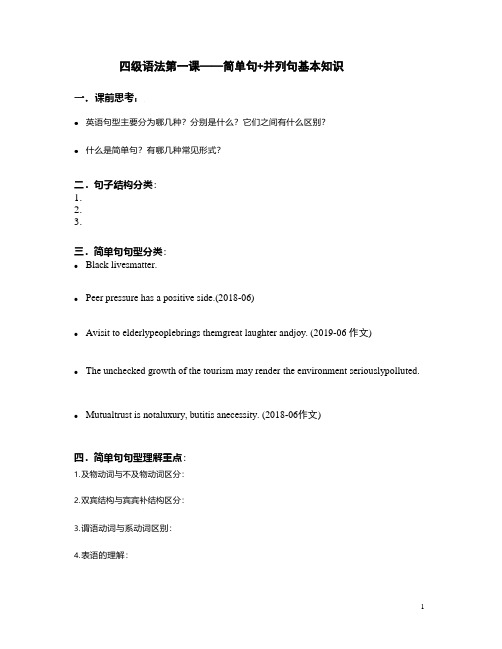
四级语法第一课——简单句+并列句基本知识一.课前思考:●英语句型主要分为哪几种?分别是什么?它们之间有什么区别?●什么是简单句?有哪几种常见形式?二.句子结构分类:1.2.3.三.简单句句型分类:●Black livesmatter.●Peer pressure has a positive side.(2018-06)●Avisit to elderlypeoplebrings themgreat laughter andjoy. (2019-06 作文)●The unchecked growth of the tourism may render the environment seriouslypolluted.●Mutualtrust is notaluxury, butitis anecessity. (2018-06作文)四.简单句句型理解重点:1.及物动词与不及物动词区分:2.双宾结构与宾宾补结构区分:3.谓语动词与系动词区别:4.表语的理解:五.简单句练习部分:●Everybody loves a payrise.●The down to earth working style won him respect andhonor.●She will make him a good husband. // She will make him a goodwife.●I will make your Englishbetter.●Money can buy you love. // Money can buy yourlove.●She is smelling the flowers. // The flowers smell good. // Your feetsmell.●青海湖最深处 25.5 米。
●人们兴高采烈,庆祝丰收。
●泰山方圆约400平方公里。
六:并列句理解:两个或以上独立分句,通过并列连词连接,各分句主谓完整各分句意思同等重要,互相独立,主要连词:and,or,but,yet Yetoccurrencesofshortagesanddroughtsarecausingfamineanddistressinsome areas, and industrial and agricultural by-products are polluting water supplies 年6月阅读)(.(01四级语法第二课——主谓一致+时态语态一.课前思考:●主谓一致指的是什么?●时态和语态分别指什么?常见的时态有哪些,分别是什么形式?二.主谓一致:1.主谓一致指谓语动词必须在人称和数与句子的主语保持一致。
- 1、下载文档前请自行甄别文档内容的完整性,平台不提供额外的编辑、内容补充、找答案等附加服务。
- 2、"仅部分预览"的文档,不可在线预览部分如存在完整性等问题,可反馈申请退款(可完整预览的文档不适用该条件!)。
- 3、如文档侵犯您的权益,请联系客服反馈,我们会尽快为您处理(人工客服工作时间:9:00-18:30)。
英语结构基础讲义We are ten years old.I like music. 我喜欢音乐。
I like to play basketball. 我喜欢打篮球。
I find that I like music.我发现我喜欢音乐。
I like music.I love you and you love him.1、简单句2、并列句I love you, but you love him.You should study hard, or you will fail.3、复合句我知道你正在想什么。
I know what you are thinking.What you are thinking is a secret.句式:句式:1、陈述句He is a student. You like music.I will eat an apple this afternoon.2、一般疑问句Is he a student?Do you like music?Will you eat an apple this afternoon?3、特殊疑问句What is he? What do you like?What will you eat this afternoon?单词记忆法:1、词根法portimport exit export2、词源法lunatic lunar露娜月亮女神siren 塞壬汽笛,警报器3、联想法chill ambulance俺不能死Ambition俺必胜agony爱过你ponderous 胖得要死1.The author finds out that good intentions alone are not enough when his attempt to be kind to an old man leaves them both feeling worse than before.2.Most people do not realize, however, that it is the regular use of “ordinary”physical punishment, and the cultural approval it enjoys,that lays the ground work for child abuse.The agency, ______to set and enforce health standard for American workers, has been promising a cotton dust standard for several years.A .whose job it is B. whose job is C. whose D. whose is3.It seems simple enough to distinguish between the organism and the surrounding environment and to separate forces acting on an organism into those that are internal and biological and those that are external and environmental.4. But my own worry today is less that of the overwhelming problem of elemental literacy than it is of the slightly more luxurious problem of the decline in the skill even of the middle-class reader, of his unwillingness to afford those spaces of silence, those luxuries of domesticity and time and concentration that surround the image of the classic act of reading.我喜欢音乐。
I like music.我喜欢音乐以前。
I like d music before.第一章时态和语态<主要是指谓语动词>一.时态⒈现在时(1)一般现在时He likes music.(2)现在进行时He is doing the housework.(3)现在完成时He has finished the work.(4)现在完成进行时He has been studying English for six years.He has studied English for six years.52. Jack ____from home for two days now, and I am beginning to worry about his safety.(03)A.has been missingB.has been missedC.had been missingD.was missed53. For some time now, world leaders___ out the necessity for agreement on arms reduction.(02)A. had been pointingB. have been pointingC. were pointing⒉过去时(1)一般过去时He watched TV last night(2)过去进行时He was doing his homework at this time yesterday.(3)过去完成时<过去的过去>He had worked for six years by 2006.(4)过去完成进行时He had been working for the factory before Marry joined the Army.⒊将来时(1)一般将来时I will study English next week.I shall study English next week.I am going to study English next week.I am about to study English next week.I am to study English next week.区别:will 和 be going to, be about to, be to 的区别如:If the metal is heated, it will expand.I am going to study English next week.I am about to study English next week.I am to study English next week.区别:be going to , be about to ,和be to 的区别如:Look , so many black clouds , it is going to rain.当有预先征兆的时候我们应该用be going to.(2)将来进行时I will be studying English at six o'clock tomorrow.如果是将来的一个具体时间我们可以用将来进行时.(3)过去将来时He said,"I will study English next week."He said that he would study English the next week.(4)将来完成时We will have finished the work by next year.I have finished the work by now.I had finished the work by last night.特例:⒈He is always speaking to his mother like this.当表示一种埋怨和责备语气的时候用现在进行代替一般现在时.2、Wait for a moment, I am coming.用现在进行时表示短暂的将来。
二.语态主动语态I wrote a letter yesterday.I will write the book.被动语态The letter was written by me yesterday.The book will be written by me.特例:⒈ I made him cryHe was made to cry by me.⒉ I heard him sing the song yesterday.He was heard to sing the song by me yesterday.句式:1、系动词类You are a student.Are you a student?What are you?2、实意动词类You like music.Do you like music?What do you like?第二章句子结构主谓宾定状补表同位I like music.<主谓宾>I gave you a bike.<双宾>I have a r ed pen.<定语>information center状语He studies hard.<程度状语>程度状语He studies English in the afternoon.<时间状语>时间状语He sings in the classroom<地点状语>He is late because he is ill.<原因状语>He goes to school by bus.<方式状语>If you come here he will come too.<条件状语>备注:在时间状语从句和条件状语从句中从句不能用将来时He came here to look after me.<目的状语>He got up so early that he caught the bus.<结果状语>He got up so early that he could catch the bus.<目的状语>He came here with a smile.<伴随状语>The Army walked in the street while people were dancing.<伴随状语>Although he is a little boy, he knows a lot. (让步状语)补语<宾补,主补>I call you Tom .<宾补>I find English easy.<宾补>I find that English is easy.sb. sb adj.You are called Tom.<主补>表语I am a student.<表语>I am excited.< 系表结构>The thing is exciting.She is beautiful.同位语<同位主语,同位宾语>You two are foolish.<同位主语>I beat you two.<同位宾语>并列结构1.Not only…but also , neither … nor, either…or均可分别位于两个分句句首构成并列句,而both…and不行。
